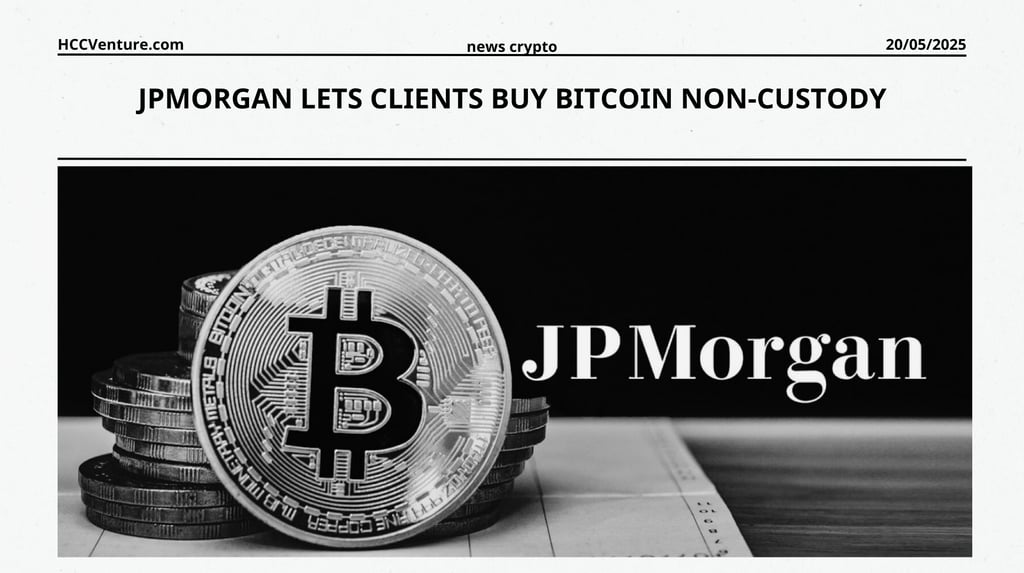JPMorgan Lets Clients Buy Bitcoin Without Custody
JPMorgan Chase, the largest bank in the United States with $4 trillion in assets under management, has announced that its customers can buy Bitcoin through the bank's services, although it does not directly custody the cryptocurrencies.
5/20/20253 min read


Why did JPMorgan decide to enter the Bitcoin market?
JPMorgan has long had a complicated relationship with cryptocurrencies. For more than a decade, Jamie Dimon has consistently expressed skepticism, calling Bitcoin a “fraud” (2017), “worthless” (2021), and most recently in 2025, comparing investing in Bitcoin to “smoking cigarettes.” However, pressure from client demand and the rapid growth of the cryptocurrency market forced the bank to adjust its strategy. JPMorgan began allowing clients to access cryptocurrency funds in 2020, and by 2025, the bank officially “turned the corner,” opening the door to direct Bitcoin trading.
The decision comes amid a strong growth in the cryptocurrency market. Bitcoin is currently hovering around $97,668 (according to Binance, April 3, 2025), with a market capitalization of $1.932 billion. The acceptance of Bitcoin by major institutions such as BlackRock, Fidelity, and even countries like El Salvador (where Bitcoin is legal tender) has put pressure on traditional banks like JPMorgan to join the trend so as not to be left behind.
Jamie Dimon is against Bitcoin, so why is JPMorgan still pushing this trade?
Despite JPMorgan’s openness to Bitcoin, Jamie Dimon has remained negative, saying he “doesn’t like” the currency and doesn’t consider it a credible investment. This contradiction illustrates the reality that big banks are forced to adapt to market trends, even when their leaders don’t believe in the intrinsic value of cryptocurrencies.
The shift reflects the power of customer demand in shaping financial institutions’ strategies. With rivals like Morgan Stanley offering Bitcoin access starting in 2021, JPMorgan cannot afford to stay out of the game if it wants to stay competitive.
What role will the connection between the two financial models play?
Allowing customers to buy Bitcoin, even if they do not hold it, shows that JPMorgan is trying to balance meeting market demand with remaining cautious about the legal and technical risks associated with cryptocurrencies. By not holding it, the bank avoids the responsibility of managing digital wallets or facing security issues, which are major risks in this field. This also helps JPMorgan maintain its image as a trusted traditional financial institution while still tapping into the profit potential of the cryptocurrency market.
JPMorgan’s decision is a major milestone, cementing Bitcoin’s status as an asset class recognized by major financial institutions. This could spur participation from institutional and retail investors, especially since other major banks such as Morgan Stanley have also offered access to Bitcoin since 2021. The involvement of financial giants adds liquidity and price stability to the cryptocurrency market, which has been considered volatile and risky.
Despite JPMorgan’s openness to Bitcoin, Jamie Dimon has insisted that he “doesn’t like” the currency and doesn’t consider it a credible investment. The contradiction reflects a reality: big banks are forced to adapt to market trends even when their executives don’t fully believe in the intrinsic value of cryptocurrencies. It also shows the power of customers to shape financial institutions’ strategies.
Conclude
JPMorgan’s decision to allow clients to purchase Bitcoin, albeit on a non-custodial basis, is a strategic move to meet growing market demand while remaining cautious about legal and technical risks. This event not only affirms Bitcoin’s position in the global financial system but also shows the inevitable change of traditional financial institutions in the face of the cryptocurrency wave. However, investors, especially in Vietnam, need to equip themselves with knowledge and be cautious when participating in this market, in a context where the legal framework is still unclear and financial risks are always lurking. The contradiction between Jamie Dimon’s views and JPMorgan’s strategy is also a reminder that, in the financial world, market demand is often stronger than personal prejudice.
Once again we give our opinion on potential projects in the crypto market. This is not investment advice, consider your portfolio. Disclaimer: The views expressed in this article are solely those of the author and do not represent the platform in any way. This article is not intended to be a guide to making investment decisions.
Compiled and analyzed by HCCVenture
Join our telegram community: HCCVenture
Explore HCCVenture group
HCCVenture © 2023. All rights reserved.

Connect with us
Popular content
Contact to us
E-mail : sp_contact@hccventure.com
Register : https://linktr.ee/holdcoincventure
Disclaimer: The information on this website is for informational purposes only and should not be considered investment advice. We are not responsible for any risks or losses arising from investment decisions based on the content here.


TERMS AND CONDITIONS • CUSTOMER PROTECTION POLICY
ANALYTICAL AND NEWS CONTENT IS COMPILED AND PROVIDED BY EXPERTS IN THE FIELD OF DIGITAL FINANCE AND BLOCKCHAIN BELONGING TO HCCVENTURE ORGANIZATION, INCLUDING OWNERSHIP OF THE CONTENT.
RESPONSIBLE FOR MANAGING ALL CONTENT AND ANALYSIS: HCCVENTURE FOUNDER - TRUONG MINH HUY
Read warnings about scams and phishing emails — REPORT A PROBLEM WITH OUR SITE.
